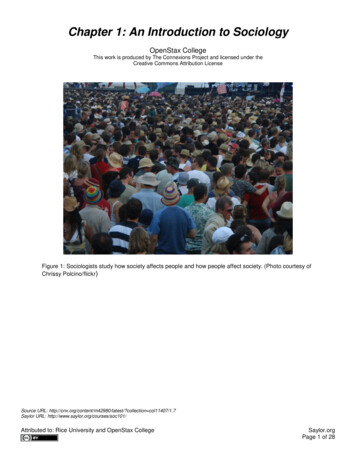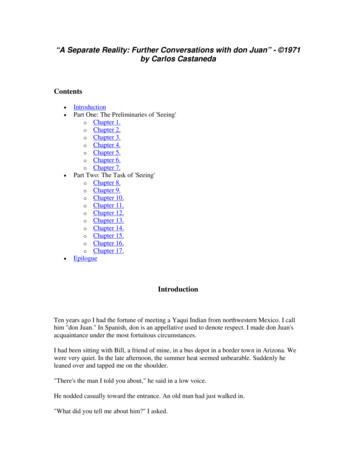
Transcription
Chapter 1: An Introduction to SociologyOpenStax CollegeThis work is produced by The Connexions Project and licensed under theCreative Commons Attribution LicenseFigure 1: Sociologists study how society affects people and how people affect society. (Photo courtesy ofChrissy Polcino/flickr)Source URL: http://cnx.org/content/m42980/latest/?collection col11407/1.7Saylor URL: http://www.saylor.org/courses/soc101/Attributed to: Rice University and OpenStax CollegeSaylor.orgPage 1 of 28
1.1 Introduction to SociologyConcerts, sports games, and political rallies can have very large crowds. When youattend one of these events, you may know only the people you came with. Yet you mayexperience a feeling of connection to the group. You are one of the crowd. You cheerand applaud when everyone else does. You boo and yell alongside them. You move outof the way when someone needs to get by, and you say "excuse me" when you need toleave. You know how to behave in this kind of crowd.It can be a very different experience if you are traveling in a foreign country and findyourself in a crowd moving down the street. You may have trouble figuring out what ishappening. Is the crowd just the usual morning rush, or is it a political protest of somekind? Perhaps there was some sort of accident or disaster. Is it safe in this crowd, orshould you try to extract yourself? How can you find out what is going on? Although youare in it, you may not feel like you are part of this crowd. You may not know what to door how to behave.Even within one type of crowd, different groups exist and different behaviors are ondisplay. At a rock concert, for example, some may enjoy singing along, others prefer tosit and observe, while still others may join in a mosh pit or try crowd surfing. Why do wefeel and act differently in different types of social situations? Why might people of asingle group exhibit different behaviors in the same situation? Why might people actingsimilarly not feel connected to others exhibiting the same behavior? These are some ofthe many questions sociologists ask as they study people and societies.1.2 What is SociologySummary: Explain concepts central to sociology Understand how different sociological perspectives have developedFigure 2: Sociologists learn about society as a whole while studying one-to-one and group interactions.(Photo courtesy of Robert S. Donovan/flickr)Source URL: http://cnx.org/content/m42980/latest/?collection col11407/1.7Saylor URL: http://www.saylor.org/courses/soc101/Attributed to: Rice University and OpenStax CollegeSaylor.orgPage 2 of 28
A dictionary defines sociology as the systematic study of society and social interaction.The word “sociology” is derived from the Latin word socius (companion) and the Greekword logos (study of), meaning “the study of companionship.” While this is a startingpoint for the discipline, sociology is actually much more complex. It uses many differentmethods to study a wide range of subject matter and to apply these studies to the realworld.What Are Society and Culture?Sociologists study all aspects and levels of society. A society is a group of peoplewhose members interact, reside in a definable area, and share a culture. A cultureincludes the group’s shared practices, values, and beliefs. One sociologist mightanalyze video of people from different societies as they carry on everydayconversations to study the rules of polite conversation from different world cultures.Another sociologist might interview a representative sample of people to see howtexting has changed the way they communicate. Yet another sociologist might studyhow migration determined the way in which language spread and changed over time. Afourth sociologist might be part of a team developing signs to warn people livingthousands of years in the future, and speaking many different languages, to stay awayfrom still-dangerous nuclear waste.The Sociological ImaginationAlthough these studies and the methods of carrying them out are different, thesociologists involved in them all have something in common. Each of them looks atsociety using what pioneer sociologist C. Wright Mills called the sociologicalimagination, sometimes also referred to as the sociological lens or sociologicalperspective. Mills defined sociological imagination as how individuals understandtheir own and others’ pasts in relation to history and social structure (1959).By looking at individuals and societies and how they interact through this lens,sociologists are able to examine what influences behavior, attitudes, and culture. Byapplying systematic and scientific methods to this process, they try to do so withoutletting their own biases and pre-conceived ideas influence their conclusions.Studying Patterns: How Sociologists View SocietyAll sociologists are interested in the experiences of individuals and how thoseexperiences are shaped by interactions with social groups and society as a whole. To asociologist, the personal decisions an individual makes do not exist in a vacuum.Cultural patterns and social forces put pressure on people to select one choice overanother. Sociologists try to identify these general patterns by examining the behavior oflarge groups of people living in the same society and experiencing the same societalpressures.Source URL: http://cnx.org/content/m42980/latest/?collection col11407/1.7Saylor URL: http://www.saylor.org/courses/soc101/Attributed to: Rice University and OpenStax CollegeSaylor.orgPage 3 of 28
The recent turmoil in the U.S. housing market and the high rate of foreclosures offer anexample of how a sociologist might explore social patterns. Owning a home has longbeen considered an essential part of the American Dream. People often work for yearsto save for a down payment on what will be the largest investment they ever make. Themonthly mortgage is often a person’s largest budget item. Missing one or moremortgage payments can result in serious consequences. The lender may foreclose onthe mortgage and repossess the property. People may lose their homes and may not beable to borrow money in the future. Walking away from the responsibility to pay debts isnot a choice most people make easily.About three million homes were repossessed in the United States between 2006 and2011. Experts predict the number could double by 2013 (Levy and Gop 2011). This is amuch higher rate than the historical average. What social factors are contributing to thissituation, and where might sociologists find patterns? Do Americans view debt,including mortgages, differently than in the past? What role do unemployment ratesplay? Might a shift in class structure be an influential factor? What about the way majoreconomic players operate?To answer these questions, sociologists will look beyond individual foreclosures atnational trends. They will see that in recent years unemployment has been at recordhighs. They will observe that many lenders approved subprime mortgages withadjustable rates that started low and ballooned. They may look into whetherunemployment and lending practices were different for members of different socialclasses, races, or genders. By analyzing the impact of these external conditions onindividuals’ choices, sociologists can better explain why people make the decisions theydo.Figure 3: Risky bank loans, falling housing prices, and high unemployment can result in higherforeclosure rates. (Photo courtesy of Jeff Turner/flickr)Source URL: http://cnx.org/content/m42980/latest/?collection col11407/1.7Saylor URL: http://www.saylor.org/courses/soc101/Attributed to: Rice University and OpenStax CollegeSaylor.orgPage 4 of 28
Another example of how society influences individual decisions can be seen in people’sopinions about and use of food stamps (also known as the Supplemental NutritionAssistance Program, or SNAP benefits). Some people believe that those who receivefood stamps are lazy and unmotivated. Statistics from the United States Department ofAgriculture show a complex picture.Table 1: Food Stamp Use by StateSociologists examine social conditions in different states to explaindifferences in the number of people receiving food stamps. (Table courtesy of U.S. Department ofAgriculture)The percentage of the population receiving food stamps is much higher in certain statesthan in others. Does this mean, if the stereotype above were applied, that people insome states are lazier and less motivated than those in other states? Sociologists studythe economies in each state – comparing unemployment rates, food, energy costs, andother factors – to explain differences in social issues like this.To identify social trends, sociologists also study how people use food stamps and howpeople react to their use. Research has found that for many people from all classes,there is a strong stigma attached to the use of food stamps. This stigma can preventpeople who qualify for this type of assistance from using food stamps. According toHanson and Gundersen (2002), how strongly this stigma is felt is linked to the generaleconomic climate. This illustrates how sociologists observe a pattern in society.Sociologists identify and study patterns related to all kinds of contemporary socialissues. The “don’t ask, don’t tell” policy, the emergence of the Tea Party as a politicalfaction, how Twitter has influenced everyday communication – these are all examples oftopics that sociologists might explore.Studying Part and Whole: How Sociologists View Social StructuresA key basis of the sociological perspective is the concept that the individual and societyare inseparable. It is impossible to study one without the other. German sociologistNorbert Elias called the process of simultaneously analyzing the behavior of individualsand the society that shapes that behavior figuration. He described it through a metaphorSource URL: http://cnx.org/content/m42980/latest/?collection col11407/1.7Saylor URL: http://www.saylor.org/courses/soc101/Attributed to: Rice University and OpenStax CollegeSaylor.orgPage 5 of 28
of dancing. There can be no dance without the dancers, but there can be no dancerswithout the dance. Without the dancers, a dance is just an idea about motions in achoreographer’s head. Without a dance, there is just a group of people moving around afloor. Similarly, there is no society without the individuals that make it up, and there arealso no individuals who are not affected by the society in which they live (Elias 1978).An application that makes this concept understandable is the practice of religion. Whilepeople experience their religion in a distinctly individual manner, religion exists in alarger social context. For instance, an individual’s religious practice may be influencedby what government dictates, holidays, teachers, places of worship, rituals, and so on.These influences underscore the important relationship between individual practices ofreligion and social pressures that influence that religious experience.Individual-Society Connections:When sociologist Nathan Kierns spoke to his friend Ashley (a pseudonym) aboutthe move she and her partner had made from an urban center to a small Midwesterntown, he was curious how the social pressures placed on a lesbian couple differedfrom one community to the other. Ashley said that in the city they had beenaccustomed to getting looks and hearing comments when she and her partnerwalked hand in hand. Otherwise, she felt that they were at least being tolerated.There had been little to no outright discrimination.Things changed when they moved to the small town for her partner’s job. For thefirst time, Ashley found herself experiencing direct discrimination because of hersexual orientation. Some of it was particularly hurtful. Landlords would not rent tothem. Ashley, who is a highly trained professional, had a great deal of difficultyfinding a new job.When Nathan asked Ashley if she and her partner became discouraged or bitterabout this new situation, Ashley said that rather than letting it get to them, theydecided to do something about it. Ashley approached groups at a local college andseveral churches in the area. Together they decided to form the town's first gaystraight alliance.The alliance has worked successfully to educate their community about same-sexcouples. It also worked to raise awareness about the kinds of discrimination Ashleyand her partner experienced in the town and how those could be eliminated. Thealliance has become a strong advocacy group, working to attain equal rights forLBGT individuals.Kierns observed that this is an excellent example of how negative social forcescan result in a positive response from individuals to bring about social change(Kierns 2011).SummarySociology is the systematic study of society and social interaction. In order to carry outtheir studies, sociologists identify cultural patterns and social forces and determine howSource URL: http://cnx.org/content/m42980/latest/?collection col11407/1.7Saylor URL: http://www.saylor.org/courses/soc101/Attributed to: Rice University and OpenStax CollegeSaylor.orgPage 6 of 28
they affect individuals and groups. They also develop ways to apply their findings to thereal world.Further ResearchSociology is a broad discipline. Different kinds of sociologists employ various methodsfor exploring the relationship between individuals and society. Check out more aboutsociology at al-approach.php.ReferencesElias, Norbert. 1978. What Is Sociology? New York: Columbia University Press.Hanson, Kenneth and Craig Gundersen. 2002. “How Unemployment Affects the FoodStamp Program.” Food Assistance and Nutrition Research Report Number 26-7. USDA.Retrieved January 19, 2012 r267/fanrr26-7.pdf).Kierns, Nathan. 2010. Ashley’s Alliance, unpublished presentation. Ohio StateUniversity.Levy, Dan and Prashan Gop. 2011. “Foreclosure Filings in U.S. May Jump 20% FromRecord 2010 as Crisis Peaks.” Bloomberg News, January 13. Retrieved January 19,2012 ks.html).Mills, C. Wright. 2000 [1959]. The Sociological Imagination. 40th ed. New York: OxfordUniversity Press.Glossaryfiguration: the process of simultaneously analyzing the behavior of an individualand the society that shapes that behaviorsociological imagination: the ability to understand how your own past relates tothat of other people, as well as to history in general and societal structures in particularsociology: is the systematic study of society and social interaction1.3 The History of SociologySummary: Explain why sociology emerged when it did Describe how sociology became a separate academic disciplineSource URL: http://cnx.org/content/m42980/latest/?collection col11407/1.7Saylor URL: http://www.saylor.org/courses/soc101/Attributed to: Rice University and OpenStax CollegeSaylor.orgPage 7 of 28
(a)(b)(c)(d)Figure 4: People have been thinking like sociologists long before sociology became a separate academicdiscipline: Plato and Aristotle, Confucius, Khaldun, and Voltaire all set the stage for modern sociology.(Photos (a),(b),(d) courtesy of Wikimedia Commons; Photo (c) courtesy of Moumou82/WikimediaCommons)Since ancient times, people have been fascinated by the relationship betweenindividuals and the societies to which they belong. Many of the topics that are central tomodern sociological scholarship were studied by ancient philosophers. Many of theseearlier thinkers were motivated by their desire to describe an ideal society.In the 13th century, Ma Tuan-Lin, a Chinese historian, first recognized social dynamicsas an underlying component of historical development in his seminal encyclopedia,General Study of Literary Remains. The next century saw the emergence of thehistorian some consider to be the world’s first sociologist: Ibn Khaldun (1332–1406) ofTunisia. He wrote about many topics of interest today, setting a foundation for bothmodern sociology and economics, including a theory of social conflict, a comparison ofnomadic and sedentary life, a description of political economy, and a study connecting atribe’s social cohesion to its capacity for power (Hannoum 2003).In the 18th century, Age of Enlightenment philosophers developed general principlesthat could be used to explain social life. Thinkers such as John Locke, Voltaire,Immanuel Kant, and Thomas Hobbes responded to what they saw as social ills bywriting on topics that they hoped would lead to social reform.The early 19th century saw great changes with the Industrial Revolution, increasedmobility, and new kinds of employment. It was also a time of great social and politicalupheaval with the rise of empires that exposed many people – for the first time – tosocieties and cultures other than their own. Millions of people were moving into citiesand many people were turning away from their traditional religious beliefs.Source URL: http://cnx.org/content/m42980/latest/?collection col11407/1.7Saylor URL: http://www.saylor.org/courses/soc101/Attributed to: Rice University and OpenStax CollegeSaylor.orgPage 8 of 28
The Father of SociologyFigure 5: Auguste Comte is considered by many to be the father of sociology. (Photo courtesy ofWikimedia CommonsThe term sociology was first coined in 1780 by the French essayist Emmanuel-JosephSieyès (1748–1836) in an unpublished manuscript (Fauré et al. 1999). In 1838, the termwas reinvented by Auguste Comte (1798–1857). Comte originally studied to be anengineer, but later became a pupil of social philosopher Claude Henri de RouvroyComte de Saint-Simon (1760–1825). They both thought that society could be studiedusing the same scientific methods utilized in natural sciences. Comte also believed inthe potential of social scientists to work toward the betterment of society. He held thatonce scholars identified the laws that governed society, sociologists could addressproblems such as poor education and poverty (Abercrombie et al. 2000).Comte named the scientific study of social patterns positivism. He described hisphilosophy in a series of books called The Course in Positive Philosophy (1830–1842)and A General View of Positivism (1848). He believed that using scientific methods toreveal the laws by which societies and individuals interact would usher in a new“positivist” age of history. While the field and its terminology have grown, sociologistsstill believe in the positive impact of their work.Karl MarxFigure 6: Karl Marx was one of the founders of sociology. His ideas about social conflict are still relevanttoday. (Photo courtesy of John Mayall/Wikimedia Commons)Karl Marx (1818–1883) was a German philosopher and economist. In 1848 he andFriedrich Engels (1820–1895) coauthored the Communist Manifesto. This book is oneSource URL: http://cnx.org/content/m42980/latest/?collection col11407/1.7Saylor URL: http://www.saylor.org/courses/soc101/Attributed to: Rice University and OpenStax CollegeSaylor.orgPage 9 of 28
of the most influential political manuscripts in history. It also presents Marx's theory ofsociety, which differed from what Comte proposed.Marx rejected Comte's positivism. He believed that societies grew and changed as aresult of the struggles of different social classes over the means of production. At thetime he was developing his theories, the Industrial Revolution and the rise of capitalismled to great disparities in wealth between the owners of the factories and workers.Capitalism, an economic system characterized by private or corporate ownership ofgoods and the means to produce them, grew in many nations.Marx predicted that inequalities of capitalism would become so extreme that workerswould eventually revolt. This would lead to the collapse of capitalism, which would bereplaced by communism. Communism is an economic system under which there is noprivate or corporate ownership: everything is owned communally and distributed asneeded. Marx believed that communism was a more equitable system than capitalism.While his economic predictions may not have come true in the time frame he predicted,Marx’s idea that social conflict leads to change in society is still one of the majortheories used in modern sociology.Creating a DisciplineIn 1873, the English philosopher Herbert Spencer (1820–1903) published The Study ofSociology, the first book with the term “sociology” in the title. Spencer rejected much ofComte’s philosophy as well as Marx's theory of class struggle and his support ofcommunism. Instead, he favored a form of government that allowed market forces tocontrol capitalism. His work influenced many early sociologists including ÉmileDurkheim (1858–1917).Durkheim helped establish sociology as a formal academic discipline by establishing thefirst European department of sociology at the University of Bordeaux in 1895 and bypublishing his Rules of the Sociological Method in 1895. In another important work,Division of Labour in Society (1893), Durkheim laid out his theory on how societiestransformed from a primitive state into a capitalist, industrial society. According toDurkheim, people rise to their proper level in society based on merit.Durkheim believed that sociologists could study objective “social facts” (Poggi 2000). Healso believed that through such studies it would be possible to determine if a societywas “healthy” or “pathological.” He saw healthy societies as stable, while pathologicalsocieties experienced a breakdown in social norms between individuals and society.In 1897, Durkheim attempted to demonstrate the effectiveness of his rules of socialresearch when he published a work titled Suicide. Durkheim examined suicide statisticsin different police districts to research differences between Catholic and Protestantcommunities. He attributed the differences to socioreligious forces rather than toindividual or psychological causes.Source URL: http://cnx.org/content/m42980/latest/?collection col11407/1.7Saylor URL: http://www.saylor.org/courses/soc101/Attributed to: Rice University and OpenStax CollegeSaylor.orgPage 10 of 28
Prominent sociologist Max Weber (1864–1920) established a sociology department inGermany at the Ludwig Maximilians University of Munich in 1919. Weber wrote onmany topics related to sociology including political change in Russia and social forcesthat affect factory workers. He is known best for his 1904 book, The Protestant Ethicand the Spirit of Capitalism. The theory that Weber sets forth in this book is stillcontroversial. Some believe that Weber was arguing that the beliefs of manyProtestants, especially Calvinists, led to the creation of capitalism. Others interpret it assimply claiming that the ideologies of capitalism and Protestantism are complementary.Weber also made a major contribution to the methodology of sociological research.Along with other researchers such as Wilhelm Dilthey (1833–1911) and Heinrich Rickert(1863–1936), Weber believed that it was difficult if not impossible to use standardscientific methods to accurately predict the behavior of groups as people hoped to do.They argued that the influence of culture on human behavior had to be taken intoaccount. This even applied to the researchers themselves, who, they believed, shouldbe aware of how their own cultural biases could influence their research. To deal withthis problem, Weber and Dilthey introduced the concept of verstehen, a German wordthat means to understand in a deep way. In seeking verstehen, outside observers of asocial world – an entire culture or a small setting – attempt to understand it from aninsider’s point of view.In his book The Nature of Social Action (1922), Weber described sociology as striving to"interpret the meaning of social action and thereby give a causal explanation of the wayin which action proceeds and the effects it produces." He and other like-mindedsociologists proposed a philosophy of antipositivism whereby social researchers wouldstrive for subjectivity as they worked to represent social processes, cultural norms, andsocietal values. This approach led to some research methods whose aim was not togeneralize or predict (traditional in science), but to systematically gain an in-depthunderstanding of social worlds.The different approaches to research based on positivism or antipositivism are oftenconsidered the foundation for the differences found today between quantitativesociology and qualitative sociology. Quantitative sociology uses statistical methodssuch as surveys with large numbers of participants. Researchers analyze data usingstatistical techniques to see if they can uncover patterns of human behavior.Qualitative sociology seeks to understand human behavior by learning about itthrough in-depth interviews, focus groups, and analysis of content sources (like books,magazines, journals, and popular media).Source URL: http://cnx.org/content/m42980/latest/?collection col11407/1.7Saylor URL: http://www.saylor.org/courses/soc101/Attributed to: Rice University and OpenStax CollegeSaylor.orgPage 11 of 28
How Do Working Moms Impact Society?:What constitutes a “typical family” in America has changed tremendously over thepast decades. One of the most notable changes has been the increasing number ofmothers who work outside the home. Earlier in U.S. society, most family householdsconsisted of one parent working outside the home and the other being the primarychildcare provider. Because of traditional gender roles and family structures, this wastypically a working father and a stay-at-home mom. Quantitative research shows thatin 1940 only 27 percent of all women worked outside the home. Today, 59.2 percent ofall women do. Almost half of women with children younger than one year of age areemployed (U.S. Congress Joint Economic Committee Report 2010).Sociologists interested in this topic might approach its study from a variety of angles.One might be interested in its impact on a child’s development, another may explorerelated economic values, while a third might examine how other social institutions haveresponded to this shift in society.A sociologist studying the impact of working mothers on a child’s development mightask questions about children raised in childcare settings. How is a child socializeddifferently when raised largely by a childcare provider rather than a parent? Do earlyexperiences in a school-like childcare setting lead to improved academic performancelater in life? How does a child with two working parents perceive gender rolescompared to a child raised with a stay-at-home parent?Another sociologist might be interested in the increase in working mothers from aneconomic perspective. Why do so many households today have dual incomes? Hasthere been a contributing change in social class expectations? What impact does thelarger economy play in the economic conditions of an individual household? Do peopleview money—savings, spending, debt—differently than they have in the past?Curiosity about this trend’s influence on social institutions might lead a researcher toexplore its effect on the nation’s educational system. Has the increase in workingmothers shifted traditional family responsibilities onto schools, such as providing lunchand even breakfast for students? How does the creation of after-school care programsshift resources away from traditional academics?As these examples show, sociologists study many real-world topics. Their researchoften influences social policies and political issues. Results from sociological studieson this topic might play a role in developing federal laws like the Family and MedicalLeave Act, or they might bolster the efforts of an advocacy group striving to reducesocial stigmas placed on stay-at-home dads, or they might help governmentsdetermine how to best allocate funding for education.SummarySociology was developed as a way to study and try to understand the changes tosociety brought on by the Industrial Revolution in the 18th and 19th centuries. Some ofthe earliest sociologists thought that societies and individuals’ roles in society could bestudied using the same scientific methodologies that were used in the natural sciences,while others believed that is was impossible to predict human behavior scientifically,Source URL: http://cnx.org/content/m42980/latest/?collection col11407/1.7Saylor URL: http://www.saylor.org/courses/soc101/Attributed to: Rice University and OpenStax CollegeSaylor.orgPage 12 of 28
and still others debated the value of such predictions. Those perspectives continue tobe represented within sociology today.Further ResearchMany sociologists helped shape the discipline. To learn more about prominentsociologists and how they changed sociology check /ferdinand-toennies/.ReferencesAbercrombie, Nicholas, Stephen Hill, and Bryan S. Turner. 2000. The PenguinDictionary of Sociology. London: Penguin.Durkheim, Émile. 1964 [1895]. The Rules of Sociological Method, edited by J. Mueller,E. George and E. Caitlin. 8th ed. Translated by S. Solovay. New York: Free Press.Fauré, Christine, Jacques Guilhaumou, Jacques Vallier, and Françoise Weil. 2007[1999]. Des Manuscrits de Sieyès, 1773–1799, Volumes I and II. Paris: Champion.Hannoum, Abdelmajid. 2003. Translation and the Colonial Imaginary: Ibn KhaldunOrientalist. Middletown, CT: Wesleyan University. Retrieved January 19, 2012(http://www.jstor.org/pss/3590803).Poggi, Gianfranco. 2000. Durkheim. Oxford, United Kingdom: Oxford University Press.U.S. Congress Joint Economic Committee. 2010. Women and the Economy, 2010: 25Years of Progress But Challenges Remain. August. Washington, DC: CongressionalPrinting Office. Retrieved January 19, 2012(http://jec.senate.gov/public/?a Files.Serve&File id ositivism: the view that social researchers should strive for
Attributed to: Rice University and OpenStax College Saylor.org Page 3 of 28 A dictionary defines sociology as the systematic study of society and social interaction. The word "sociology" is derived from the Latin word socius (companion) and the Greek word logos (study of), meaning "the study of companionship." While this is a starting











